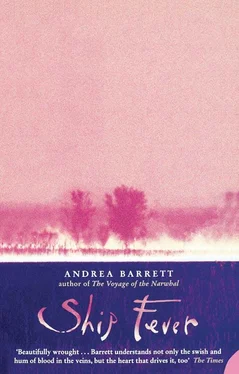Dr. Jaques stopped beside the first berth in which a passenger was lying. “There is sickness here,” he said to Lauchlin.
Lauchlin gaped; did the man think him a fool? Dr. Jaques felt the young man’s pulse and examined his tongue, then gestured for Lauchlin to do the same. Lauchlin shook his head and stepped back, now seeing as his eyes adjusted to the light all the other people collapsed on the bare boards. They shook with chills, their muscles twitched, some of them muttered deliriously. Others were sunk in a stupor so deep it resembled death. On the chest of a man who had torn off his shirt, Lauchlin could see the characteristic rash; on another, farther along, the dusky coloring of his skin.
“Ship fever,” Dr. Jaques said, and headed quickly back up the ladder.
“Typhus,” Lauchlin said, behind him. “We’ll have to find beds for them at once…”
But Dr. Jaques was thrusting more papers into the hands of the mate, with instructions to have the captain fill them out by the following day. “We’ll send a steamer for the healthy,” he said. “As soon as we can. I’ll be back to inspect them before we load. I’ll write an order to admit ten of the patients to the hospital, but the rest will have to stay here for another few days.”
Before the mate was finished protesting, Dr. Jaques had returned to his boat, with Lauchlin reluctantly following. “Nothing else to do,” Dr. Jaques told Lauchlin. “Nothing. You’ll see why when we get back to the island.”
The second ship they boarded, a brig, was not quite so bad as the first; the passengers well enough to stand had cleaned and dressed themselves and were waiting on deck to be reviewed. They were very disappointed to learn that they were not to be carried immediately to Quebec or Montreal.
“Tomorrow,” Dr. Jaques told the captain. “Or the next day. We’re very short-handed just now.”
Meanwhile Lauchlin could see that the water-barrels were nearly empty, and the pig-pens and chicken-coops silent. The passengers’ beds had been thrown in the river. He said, “But…” and clutched the papers Dr. Jaques had asked him to hold. He said, “I’m sorry,” to the sputtering captain; then he said nothing. It was impossible to guess the right things to say or do.
The third ship they visited, a bark, was very much worse. The captain had died four days before reaching Grosse Isle, and the mate who’d brought the bark the rest of the way was sick himself, only capable of responding in broken phrases to Dr. Jaques’s questions. They had buried a hundred and seven at sea, he said. Or perhaps it was a hundred and seventy. When they ran out of old sails to use as shrouds they’d slipped the bodies into weighted meal-sacks and tipped them over the bulwarks on hatch-battens. There were many sick below. Along the rails a crowd stood pale and thin, some propped up by their companions but pretending desperately to be well. Two boys caught Lauchlin’s eye — still in their teens, dark-haired and gaunt, leaning against each other’s shoulders for support. Perhaps they were brothers. When they saw Lauchlin looking at them, they looked at the deck.
He said nothing to them, nor to Dr. Jaques; by now his silence seemed unbreakable. There was no way to make sense of this situation. From the deck he saw the green island, the sun glinting on whitecaps, the hills lolloping gently toward the horizon from the river’s edge. And for a moment he thought longingly of his clean, empty office at home.
Into the hold: again, again. Already Lauchlin felt as though he knew that place by heart. The darkness, of course; and the rotting food, and the filth sloshing underfoot. The fetid bedding alive with vermin and everywhere the sick. But a last surprise awaited him here. He inched up to a berth in which two people lay mashed side by side. He leaned over to separate them, for comfort, and found that both were dead.
He vomited into a corner, a place already so filthy he couldn’t make it worse. Then he scrambled up the ladder and hung breathing heavily over the rail. It was too much, it was impossible. He would go home at once, on the next steamer out, and when Susannah chided him he would tell her that this was not what he had bargained for: this was madness, he could be of no help. All the instruments he’d learned to use, all his theories and knowledge were worth nothing here. These people needed orderlies and gravediggers and maids and cooks; not physicians, not science. They needed food, sleep, baths, housing, priests.
Dr. Jaques came to fetch him. “Feel better?” he asked, offering a clean handkerchief. “Don’t be embarrassed — I did the same thing when I started. Everyone does. Dr. Moorhead fainted six times his first day out on the ships. Up and down like a Jack-in-the-box, you never saw a face that color in your life. You’ll be all right. Are you ready?”
He turned and backed down the companionway again, looking expectantly over his shoulder at Lauchlin. Lauchlin spat into the handkerchief one last time and steadied himself. Of course he had to follow Dr. Jaques. He was young, strong, healthy. “You’ll get used to it,” Dr. Jaques said, as the darkness folded over their heads. “They’re not all this bad. This is among the worst we’ve seen.”
Among the worst? What could be worse? Lauchlin turned his eyes from one impossible sight to the next, determined to follow Dr. Jaques’s lead. Dr. Jaques gave orders to some sailors behind him, sending one up on deck to recruit more hands and another back to his boat, with instructions to have him gather up whatever other boats were available.
“You men,” he said to the sailors who’d reluctantly come to join them. “You’ll have to help here — we have to get these bodies off the ship. There’s a sovereign in it for each of you who’ll do a good hour’s work.”
Even with that vast sum, there were not so many volunteers; he checked the passengers up on deck, but among them not one was strong enough to help. The remainder hunched in corners or lay on the planks, shivering and dull-eyed. Lauchlin shed his coat and rolled up his shirt sleeves and did as Dr. Jaques directed. He and Dr. Jaques and the sailors formed a chain, as they might to pass buckets of water for a fire. Down the length of the hold, up the ladder, across the deck to the rail.
There were boathooks involved at the ladder, where the bodies had to make a transition from one level to the next, but Lauchlin could not bear to look at them or even admit their existence. No thinking, he told himself. Follow orders, do what’s needed. He would not, until this task was done, see the ropes binding bodies into bundles and then lowering them, heads and limbs dangling, down the side of the ship to the boats waiting below. Had he seen that journey’s last stage, he might not have been able to move, as he did, from berth to berth, gently turning bodies and closing eyes and lifting shoulders as Dr. Jaques lifted legs.
The eighteenth body he lifted and passed was a young woman, hardly more than a girl, who’d been dead for several days. Her feet were black and twice their normal size. The nineteenth body, almost crushed beneath the eighteenth, was another young woman, perhaps twenty-two or three. Her hair was very long, matted around her face and neck. Lauchlin had to move the hank aside before he could grasp her shoulders. His mother had had hair like this, black and heavy and perfectly straight; for an instant, as he touched it, he could see her face. It took him a second to realize that this woman’s flesh was still warm. As his fingers tightened reflexively on her arms, she groaned.
The woman, whose name was Nora Kynd, heard Lauchlin’s voice without at first understanding his words. In her delirious half-sleep, she was reliving the last week of her passage.
Читать дальше
Конец ознакомительного отрывка
Купить книгу












